| |
 |
Russian
7-stringed guitar |
 |
| Guitar in Russia |
B. Wolman
Guitar in Russia
Essay on the history of guitar art
Leningrad 1961.
Selected chapters: |
|
|
| |
Foreword |
 Translated by Google Translate Translated by Google Translate |
Known neglect with which belong to the guitar even many professional musicians, is based on a misunderstanding of its artistic merits, not knowing the history of the instrument and its literature. Lack of power prevented her guitar sound become a permanent member symphony orchestra. It has been widely used mainly in amateur music-making, which has successfully served as an accompanying and solo instrument, second in this respect only the piano, this "orchestra in miniature". However, as some piano and other musical instruments, guitar, and used as a concert instrument kind of sound, which was created for the special literature existed virtuoso performers, attracted the attention of music lovers in the West and in Russia.
Illuminate the history of the guitar art in Russia from its inception to the present day and set the outlook for the future of guitar in the USSR - the task set himself the author of this paper. To this end, in addition to chapters that narrate in chronological order of the past and present guitar and short monographic essays on outstanding Russian guitarists in the work included two introductory chapters. The first describes the origin of the instrument and its existence, the second considers the guitar as an accompanying instrument at a certain historical stage played an important role in strengthening the democratic foundations of Russian vocal art.
About how the author managed to perform tasks - word book readers available, but if it will help to some extent the establishment view on the guitar as artistically valuable tool that requires no bias, and the objective to be treated, the main objective of the work will be achieved.
I consider it necessary to express my deep gratitude to VI Yashnevo, EI. Isakova, EN Ryabokon, LF Andronov, EM Makeyeva VS Sazonov AV Panayev and other guitarists and friends guitar. They are treated with great interest to this work and provided me with some sheet music, and other materials that are not in public libraries.
|
| Russian performers on the seven-string guitar |
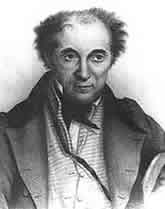
Andrey Osipovich Sikhra (1773 – 1850)
was born 1773 in Vilno (the modern Vilnius) in the family of a music teacher. In the youth he concerted as harpist, played the six-stringed guitar. Then he was keen on the seven-stringed guitar and devoted to it his whole life. 1801 the musician went to Moscow where he began to make a repertoire for the seven-stringed guitar and to teach his first disciples.
Sikhra, a talented musician, kind and charming man, was soon an idol of many followers and admires.
After the proscription of Napoleon from Russia he went to Petersburg and remains here till the end of his life (died 1850). Here, in Petersburg, he, a ripe musician and pedagogue, creates his school of playing at the seven- stringed guitar. A. Sikhra was not only a talented but also highly-educated musician. He was high valued by M. Glinka, A. Dargomyzhskiy, A.Varlamov, A. Dyubyuk, D. Fild and many other workers of Russian culture. |
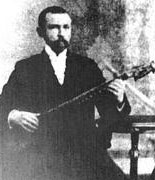
Nicephor Slepuhov (1867 – 1928)
- Russian musician, a guitarist. Lost his father early in the age of 9, was identified by his mother in Voronezh monastery, where he worked on the candle factory, and having a good voice, sang in the church choir. Regent monastery, pay attention to good vocal and outstanding musical ability boy gave him to learn to play the violin. He studied Slepuhov is likely to open a pianist MK Hamburg in 1879, the new Voronezh music classes. Game taught him Lev Malkin, who graduated from the Moscow Conservatory. Soon the student has reached such a high level of performance that the teacher himself took him to Moscow, where the young man in 1890 he entered the Conservatory as a violin. |
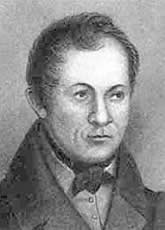 Mikhail Timofeevich Vysotsky (1791 – 1837)
Russian guitarist-virtuoso and guitar composer. He learned the guitar playing by S. N. Aksenov. He was interested for classics, especially for Bach, whose fugues he tried to arrange for the guitar. This affected the serious and noble style of his guitar compositions: most of all phantasies and variations of Russian folk themes (cycles from 4-5 variations with "preludes" and "endings"), there are also arrangements for the guitar of Mozart', Beethoven' and Fild's pieces (the musician knew the last) and others. 83 of them are issued, also his "Practical and theoretical school for the guitar" (1836).
|
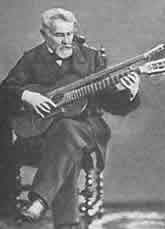 Nikolay Petrovich Makarov (1810 – 1890)
- the famous Russian guitarist-performer. He was born 1810 in Chukhloma of Kostroma region. His childhood he spent in the estates of his father and his aunt M. P. Volkonskaya. He served as an officer in the army. From childhood he played violin. In the age of 28 years he interested for guitar, in the period of study in the military academy in Warsaw he learned to play at the six-stringed ("Spanish") guitar and working daily 10-12 hours, had soon significant success.
The first concert of Makarov took place in Tula 1841 in the hall of Noble Assembly, where he played the first part of M. Giuliani's third concert. 1852 Makarov goes abroad, where he meets with greatest guitarists of Europe: Tsany di Ferranty, M. Carcassi, N. Kost, I. K. Merts, guitar master I. Shertser |
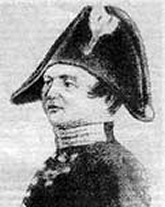
Semyon Aksenov (1784 or 1790 – 1853)
Russian seven-string guitarist and composer. He was born in Ryazan. He took guitar lessons from SA Sichrow and was considered the best of his disciple, though differed in a number of issues with his teacher. Seven-string guitar instrument considered more melodious and expressive-negative, than the fine (as it believed Sichrow). Wrote fantasies, romances, variations and potpourri on Russian folk songs. That Russian melodies, and not a classic like Sichrow form the basis of his guitar treatments. Introduced the technique of guitar playing so-called "singing style" (legato) and opened the way to play harmonics on all notes. |
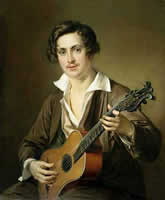
Vladimir Morkov (1801 – 1864)
- Russian guitarist. Guitar studied with AO Sichrow, who dedicated his disciple "theoretical and practical school for seven-string guitar".
Vladimir Morkov - the author of "Full school for seven-string guitars, with the application of plays for the newly enhanced-tion of ten guitar c indicating its order" (1862) and a number of compositions and transcriptions for your instrument (including transcriptions of several works by Giuliani and Mertz ). Wrote "Historical Sketch of Russian opera from its beginning to 1862" (St. Petersburg, 1862 [1899]), in which close to valuable, sometimes the only indications there are many obvious mistakes. |
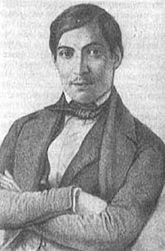
Mikhail Stakhovich (1819 – 1858)
- an amateur guitarist, poet, writer, collector of Russian folk songs, the student MT Vysotsky and AO Sichrow. Born in the village pal Eletski county province of Orel Russia. Descended from an ancient noble family, which is mentioned in the genealogical books of Poltava, Chernihiv, Moscow and Orel provinces. Initial inflammation and the formation of tanie received a home under the supervision of a French tutor. In 1841, he graduated from the verbal faculty of Moscow University. As he finished a few years traveling abroad, and on his return to Russia was engaged in literature, music and the study of folklore.
|
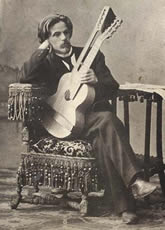 Valerian A. Rusanov (1866 – 1918)
- russian guitarist, composer, teacher and writer on music, musical and public figure. He has made a great contribution to the popularization of the guitar in Russia. According to the versatility of its activities in the field of guitar is a unique phenomenon. Guitarist, educator, composer (wrote about 300 works), historian guitar, editor and publisher of the magazine "Guitarist" (1904-1906), editor of "Music guitarist" 1907-1908, a journalist of the same magazine, and the magazine "Accord" in 1911 and 1913, 1914, head of an guitarists Moscow Society of mandolin and guitar players and guitar organizer of "Mean" in it, conductor of the orchestra of folk instruments of the Moscow society of playing folk music lovers and secular singing, guitarist-singer, public musical activities; either before or after him, not only in Russia, but throughout the history of the guitar world guitar does not know and does not know of such a figure.
|
Pavel Fedoseevich Beloshein (1799 – 1869)
- Russian guitarist and composer. Apprentice A.O Sichra and M.T. Vysotsky. He has performed in concerts. Transcribed for guitar folk songs and romantic ballads ("How are our gate", "I have sown the quinoa" and others), and excerpts from operas. Author of numerous polonaises, waltzes, quadrilles and other dance pieces. He was known as the author of fine guitars-tion of plays, music magazines were placed in 20-ies of the XIX century. Some of his operatic transcriptions and processing of folk songs come out and separate editions. Published in St. Petersburg, "Journal for the seven-string guitar" |
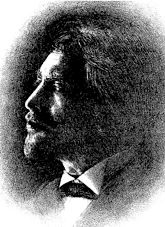
Ivan Liakhov (1813 – 1877)
- Russian guitarist, composer and teacher. One of the most-daro twisted guitar players of his time and the most dedicated guitar art musicians. During his student days he took lessons on the guitar by MT Vysotsky later in SA Sichrow and music theory - the AI Dubuc. By profession, was a veterinarian, he graduated from the Moscow Medical-Surgical Academy. Until 1872, he served in various departments, after which he retired. Was firm, proud man is always needed. Was known in Moscow as a consummate virtuoso guitarist and composer. |
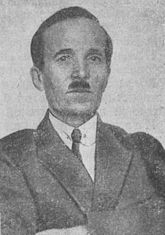
Vasily Yuriev (1881 – 1962)
- a seven-string guitar singer, music teacher and composer. He has made a great contribution to the literature of the seven-stringed guitar, the author of the original pieces, seven-string guitar transcriptions for Russian, Soviet and foreign classics, arrangements of folk songs, and compiled a number of different guitar collections. He studied with guitarist-educator Alexander Solovyov. Over the years of study met with an extensive concert repertoire seven-string guitars, including "Ekzertsitsii" (concert etudes) Andrew Sichrow, plays ultimate technical difficulties. In 1903 he began an active performing activities. At the same time he taught guitar in society, "Music and singing," worked for some time in the Gypsy Theatre "Romen", and in 1936, at the State Russian Folk Orchestra (1946 - named after N. Osipova). Issued by the school (1939, MF Ivanov, VM St. George) and the tutorial game for the seven-stringed guitar (1957, 1958), which was repeatedly reprinted. Among his pupils A. Shiryalin. |
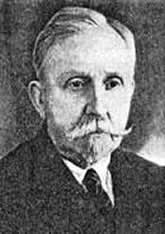
Vasily Yashnev (1879 – 1962)
- Russian musician, guitarist, teacher, composer, social activist. He was born on December 31, 1879 in St. Petersburg. In his youth, taught himself to play the guitar. In his younger years, has written several songs that are issued in the private press and performed at concerts. Lacking knowledge of music theory sought the advice of Professor N. St. Petersburg Conservatory Sokolov, who, seeing his compositions advised to enroll in the conservatory. In 1913, VI Yashnevo graduated from the St. Petersburg Conservatory in composition. His teachers were N. Rimsky-Korsakov, AK Glazunov, NA Falcons. |
|
|
|



